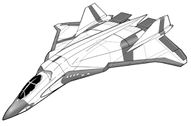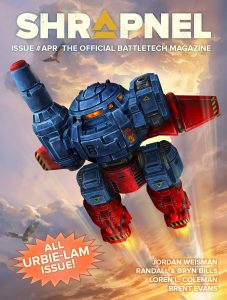Difference between revisions of "Firebird"
(started new article) |
m (copyedits) |
||
| Line 17: | Line 17: | ||
| tracking & targeting system = Dwyerson Mark IX | | tracking & targeting system = Dwyerson Mark IX | ||
| heat sinks = 10 | | heat sinks = 10 | ||
| − | |||
| BV (2.0) = 403 | | BV (2.0) = 403 | ||
}} | }} | ||
| Line 23: | Line 22: | ||
==Description== | ==Description== | ||
| − | The Firebird was built on [[Capella]] as an early, [[Age of War]] era aerospace fighter design. Underpowered and lightly armored, it did not fulfill the expectations of the [[CCAF]]. Though it carried enough fuel to achieve good velocity in space it was not very maneuverable. Its low speed and sluggish handling in atmospheric flight combined with its weak rear armor and lack of aft-mounted weapons made it easy prey for even the lightest conventional fighters. | + | The '''''Firebird''''' was built on [[Capella]] as an early, [[Age of War]]-era [[aerospace fighter]] design. Underpowered and lightly-armored, it did not fulfill the expectations of the [[CCAF]]. Though it carried enough fuel to achieve good velocity in space, it was not very maneuverable. Its low speed and sluggish handling in atmospheric flight combined with its weak rear armor and lack of aft-mounted weapons made it easy prey for even the lightest conventional fighters. |
| − | With the rapid development of aerospace technologies the Firebird quickly became obsolete and was taken out of CCAF service and scrapped in 2420. The [[Taurian Concordat]] used some units captured during the [[Rim War]] but retired the last of them in [[2437]].<ref>''Era Digest: Age of War'', pp. 27-28, "FR-1 Firebird"</ref> | + | With the rapid development of aerospace technologies, the Firebird quickly became obsolete and was taken out of CCAF service and scrapped in [[2420]]. The [[Taurian Concordat]] used some units captured during the [[Rim War]] but retired the last of them in [[2437]].<ref>''Era Digest: Age of War'', pp. 27-28, "FR-1 Firebird"</ref> |
==Armament== | ==Armament== | ||
| − | Realizing their design could not handle dogfights the developers equipped it with long-range weapons to stay as far away from enemies as possible. Two LRM 10 launchers mounted in the wings and a light autocannon in the nose, each with | + | Realizing their design could not handle dogfights, the developers equipped it with long-range weapons to stay as far away from enemies as possible. Two LRM-10 launchers mounted in the wings and a light autocannon in the nose, each with one ton of ammunition, met those requirements and gave it a potent punch for hit-and-run strikes. |
==Variants== | ==Variants== | ||
Revision as of 21:36, 8 August 2011

| |
| Firebird | |
| Production information | |
| Manufacturer | Mujika Aerospace Technologies |
| Model | FR-1 |
| Class | Medium Aerospace |
| Tech Base | Inner Sphere (Primitive) |
| Technical specifications | |
| Mass | 45 tons |
| Structural Integrity | 5 |
| Frame | Mujika Aerospace Type 4 |
| Power Plant | Rawlings 165F |
| Fuel | 240 |
| Armament |
1x Imperator-D Autocannon |
| Communications System | Endicott Type 20 |
| Tracking & Targeting System | Dwyerson Mark IX |
| Heat Sinks | 10 |
| BV (2.0) | 403 |
Description
The Firebird was built on Capella as an early, Age of War-era aerospace fighter design. Underpowered and lightly-armored, it did not fulfill the expectations of the CCAF. Though it carried enough fuel to achieve good velocity in space, it was not very maneuverable. Its low speed and sluggish handling in atmospheric flight combined with its weak rear armor and lack of aft-mounted weapons made it easy prey for even the lightest conventional fighters.
With the rapid development of aerospace technologies, the Firebird quickly became obsolete and was taken out of CCAF service and scrapped in 2420. The Taurian Concordat used some units captured during the Rim War but retired the last of them in 2437.[1]
Armament
Realizing their design could not handle dogfights, the developers equipped it with long-range weapons to stay as far away from enemies as possible. Two LRM-10 launchers mounted in the wings and a light autocannon in the nose, each with one ton of ammunition, met those requirements and gave it a potent punch for hit-and-run strikes.
Variants
Due to its short service life no variants were known to exist.
References
- ↑ Era Digest: Age of War, pp. 27-28, "FR-1 Firebird"


